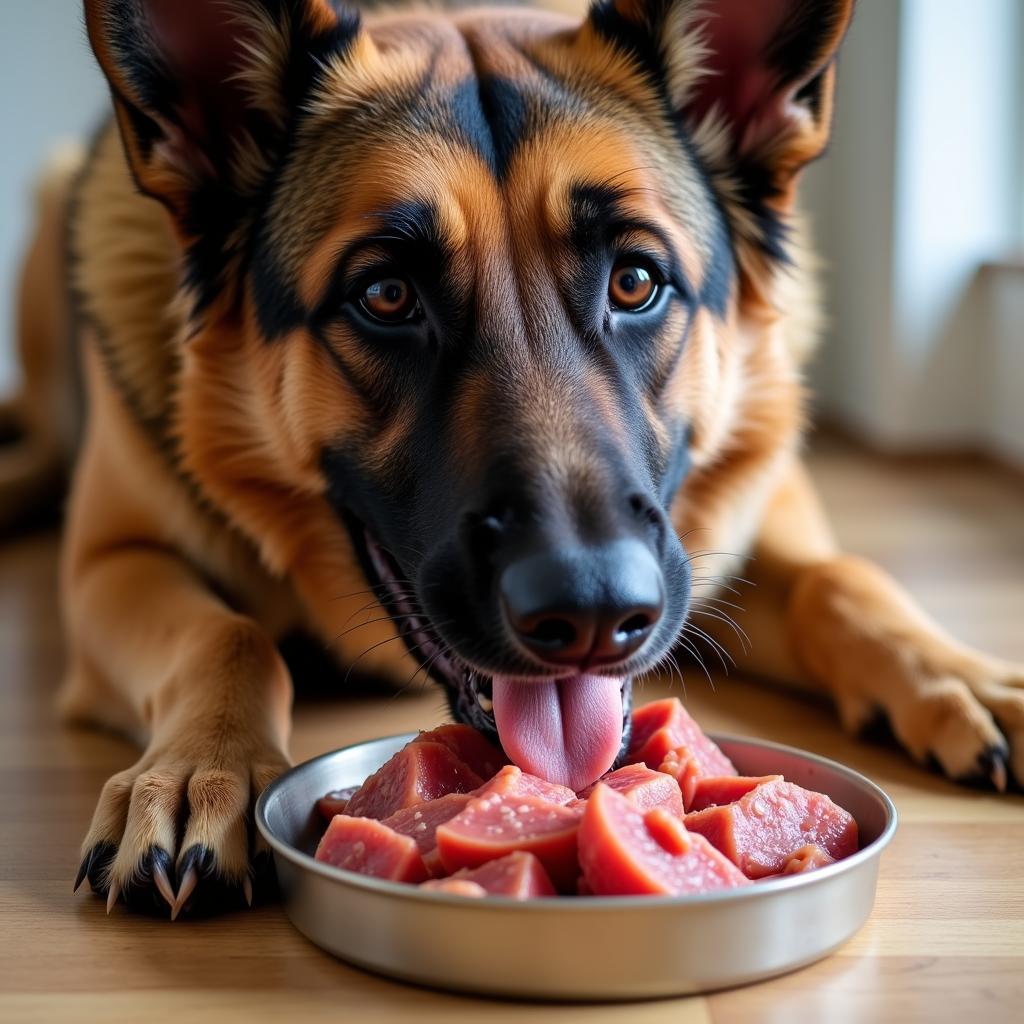A Raw Food Diet For German Shepherds has gained popularity among some owners seeking a more natural approach to feeding their beloved companions. But is it the right choice for your GSD? Let’s delve into the details of a raw food diet for German shepherds, exploring the potential benefits, risks, and everything you need to know to make an informed decision. raw food diet for german shepherd dogs
Understanding the Raw Food Diet for German Shepherds
The raw food diet, often referred to as the BARF (Biologically Appropriate Raw Food) diet, typically consists of uncooked muscle meat, bones, organs, fruits, and vegetables. Proponents argue that this diet mimics the ancestral diet of wolves, claiming it leads to improved digestion, shinier coats, higher energy levels, and better overall health. However, it’s crucial to understand the nuances of this dietary approach before implementing it for your German shepherd.
What are the core components of a raw food diet? Primarily, it involves feeding your GSD a variety of raw meats, including chicken, beef, lamb, and fish. Organ meats, such as liver and kidney, are also incorporated to provide essential vitamins and minerals. Bones are often included for calcium and other nutrients, but they must be raw and appropriately sized to avoid choking hazards. Fruits and vegetables offer additional vitamins, minerals, and fiber.
Benefits and Risks of a Raw Food Diet for German Shepherds
While a raw food diet can offer some potential benefits, it’s important to weigh them against the potential risks. Some reported benefits include improved digestion, healthier skin and coat, and increased energy levels. However, the raw food diet carries significant risks, including bacterial contamination from raw meat and potential nutritional imbalances if the diet isn’t carefully formulated. Raw bones can also pose a choking hazard or cause internal injuries.
Is a raw food diet suitable for all German shepherds? No, it isn’t. Puppies, pregnant or lactating females, and senior dogs have different nutritional needs and may be more susceptible to the risks associated with a raw food diet. It’s vital to consult with a veterinarian specializing in canine nutrition before switching your German shepherd to a raw food diet.
 German Shepherd Eating Raw Food
German Shepherd Eating Raw Food
How to Transition Your German Shepherd to a Raw Food Diet
If you decide to transition your German shepherd to a raw food diet after consulting with your veterinarian, it’s essential to do so gradually. Start by introducing small amounts of raw food alongside their current diet. Slowly increase the proportion of raw food while decreasing the amount of their previous food over several weeks. This allows your dog’s digestive system to adapt to the change. Closely monitor your dog for any signs of digestive upset, such as vomiting or diarrhea, and adjust the transition process accordingly. You may also consider ancestral canine dog food as an alternative.
What if my German shepherd experiences digestive issues during the transition? If your dog experiences digestive problems, slow down the transition process or consult with your veterinarian. They may recommend specific supplements or adjustments to the diet to help your dog adapt. Remember, every dog is different, and the transition to a raw food diet should be tailored to your individual dog’s needs.
Essential Nutrients for German Shepherds on a Raw Food Diet
A balanced raw food diet for German shepherds must provide all the essential nutrients they need to thrive. This includes adequate amounts of protein, fat, calcium, phosphorus, and various vitamins and minerals. Working with a veterinary nutritionist is crucial to ensure the diet meets your dog’s specific requirements. They can help you create a balanced meal plan and address any potential nutritional deficiencies.
How can I ensure my German Shepherd receives all the necessary nutrients? Detailed nutritional analysis and careful meal planning are essential. A veterinary nutritionist can help you determine the appropriate proportions of muscle meat, bone, organs, fruits, and vegetables to meet your dog’s nutritional needs. They may also recommend supplements to ensure optimal nutrient intake. Looking at best food for husky dogs can offer inspiration for a varied diet, even for German Shepherds.
Conclusion
A raw food diet for German shepherds can be a complex undertaking, requiring careful planning, preparation, and monitoring. While some owners report positive results, it’s crucial to be aware of the potential risks and consult with a qualified professional. By understanding the benefits, risks, and essential nutrients involved, you can make an informed decision about whether a raw food diet is the right choice for your furry companion. Remember, a balanced and appropriate diet is key to your German shepherd’s long-term health and well-being. If you are concerned about the cost of feeding a raw diet, you can find out how much food does a german shepherd eat per month.
FAQ
- Is a raw food diet safe for my German shepherd puppy?
- What are the signs of nutritional deficiencies in German shepherds on a raw food diet?
- How can I prevent bacterial contamination when preparing raw food for my dog?
- What are the best sources of raw meat for a German shepherd?
- How often should I feed my German shepherd a raw food diet?
- Can I combine raw food with kibble for my German shepherd?
- What are the alternatives to a completely raw food diet for German shepherds?
For further assistance, please contact us: Phone: 02437655121, Email: minacones@gmail.com Or visit us at: 3PGH+8R9, ĐT70A, thôn Trung, Bắc Từ Liêm, Hà Nội, Việt Nam. We have a 24/7 customer support team. Check out our recipe for duck sweet potato dog food for a cooked meal option.